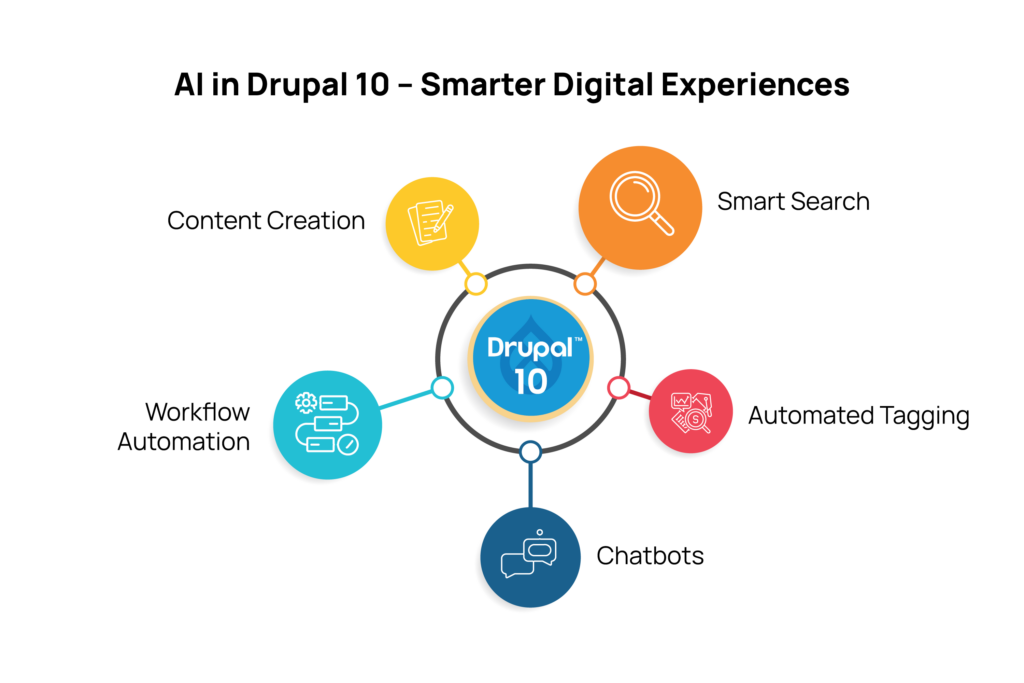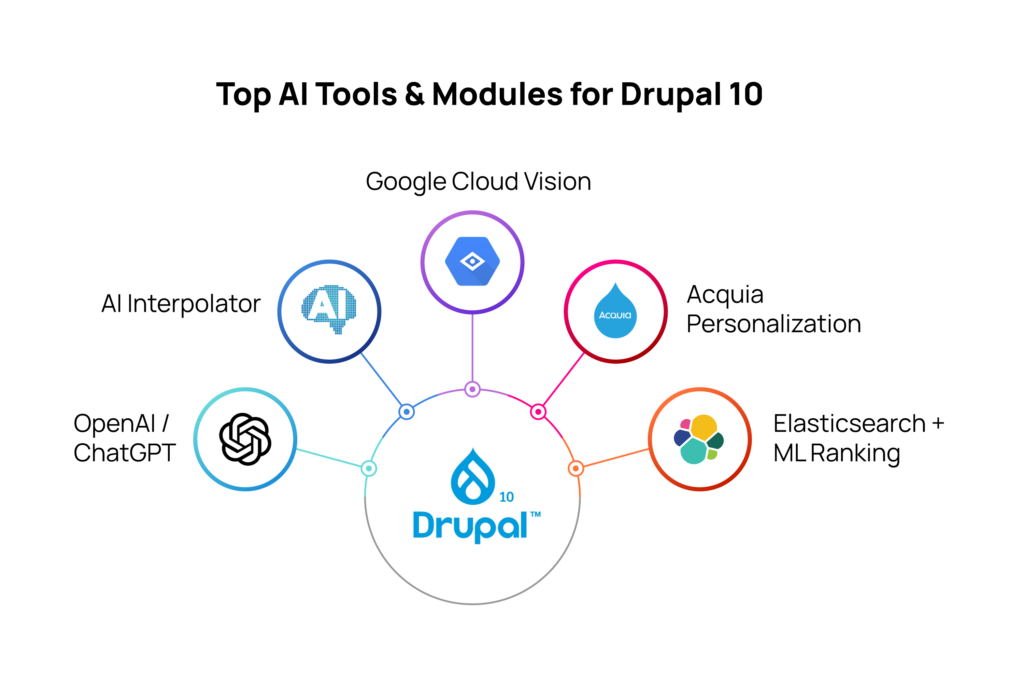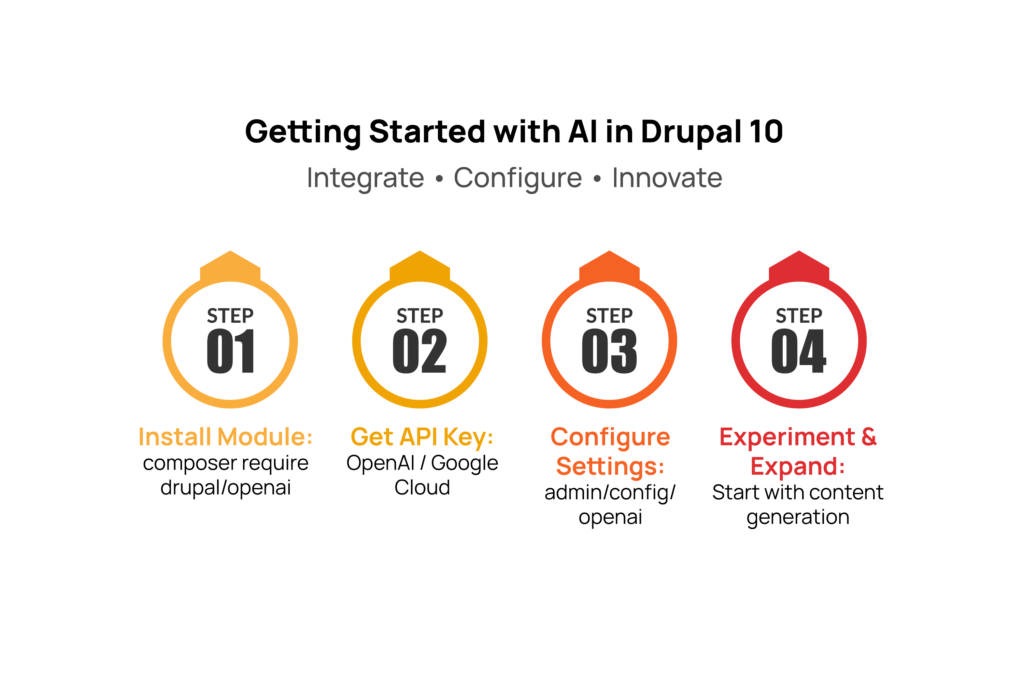


Balasubramanian
5 Minutes read
AI in Drupal 10: Transforming Digital Experiences with Intelligence
Artificial Intelligence (AI) is no longer a futuristic concept — it’s reshaping how websites are built, managed, and optimized today. With the release of Drupal 10, the platform has embraced AI-driven innovations that simplify content management, enhance personalization, and empower editors and developers to work smarter.
Let’s explore how AI is making its mark in Drupal 10, what tools are available, and how you can integrate them into your next project.
What AI Means for Drupal
In Drupal, AI refers to the integration of intelligent tools and algorithms that automate routine tasks, enhance user experiences, and generate insights from data. It transforms Drupal from a traditional Content Management System (CMS) into a smart Digital Experience Platform (DXP)
Key areas where AI plays a growing role include
- Content generation and optimization
- Smart search and recommendations
- Automated media tagging
- Chatbots and conversational experiences
- Predictive analytics and personalization
Key AI Features and Integrations in Drupal 10

1. AI-Powered Content Creation
With integrations like OpenAI (ChatGPT), content editors can now create, rephrase, or summarize content directly in Drupal. For example, the OpenAI CKEditor plugin allows users to highlight text and instantly generate alternative wording, translations, or SEO-friendly meta descriptions — all within the editor.
2. Smarter Search and Recommendations
By combining Search API, Solr, or Elasticsearch with AI ranking models, Drupal can now deliver context-aware search results. Additionally, integrating AI recommendation engines like Recombee or Amazon Personalize helps tailor content to each visitor’s interests.
3. Automated Image Recognition and Tagging
AI-powered tagging modules use services such as Google Cloud Vision API or AWS Rekognition to analyze uploaded images and generate tags, categories, or alt text automatically.
4. AI Chatbots and Conversational Interfaces
Drupal can integrate with Dialogflow, Rasa, or ChatGPT APIs to create intelligent chatbots that guide users, answer FAQs, and even assist with form submissions or support requests.
5. AI-Driven Workflow Automation
From content scheduling to trend prediction, AI can optimize editorial workflows by suggesting the best publishing times, alerting editors about outdated content, and prioritizing updates based on engagement.
Popular AI Modules and APIs for Drupal 10

- OpenAI / ChatGPT Integration — Generate, summarize, and edit content using AI text models.
- AI Interpolator — Adds intelligent suggestions within Drupal fields.
- Google Cloud Vision — Automatically tags and classifies uploaded images.
- Acquia Personalization — AI-based personalization for enterprise sites.
- Elasticsearch + ML Ranking — Improves search relevance using machine learning.
Real-World Use Cases
- E-commerce: Personalized product recommendations and predictive analytics.
- Media portals: Automatic tagging and categorization for large content libraries.
- Education: Adaptive learning experiences based on user progress.
- Enterprise intranets: AI-based document search and summarization.
Getting Started with AI in Drupal 10

- Install the desired module: composer require Drupal/ Openai
- Obtain an API key from OpenAI, Google Cloud, or another provider.
- Configure settings via /admin/config/OpenAI or the module’s admin UI.
- Experiment and iterate — start small with content generation or tagging before expanding to personalization or analytics.
The Future of AI in Drupal
Drupal’s roadmap and community innovation suggest that AI will soon become a standard layer of the digital experience stack. Expect to see smarter layout and UX recommendations, AI-assisted development, and context-aware personalization at scale.
Conclusion
AI in Drupal 10 is not just a trend — it’s the next step toward intelligent, data-driven digital experiences. By combining Drupal’s flexibility with AI’s capabilities, organizations can deliver faster, smarter, and more personalized websites and web-based application than ever before.





